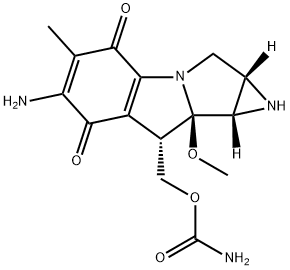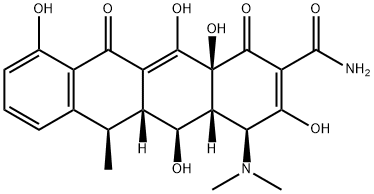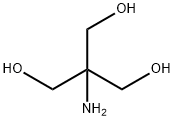MitomycinC , 98% , 50-07-7
Synonym(s):
Mitocin C, MMC;Mitomycin;Mitomycin C, Streptomyces caespitosus - CAS 50-07-7 - Calbiochem
CAS NO.:50-07-7
Empirical Formula: C15H18N4O5
Molecular Weight: 334.33
MDL number: MFCD00078109
EINECS: 200-008-6
PRODUCT Properties
| Melting point: | 360 °C |
| Boiling point: | 471.14°C (rough estimate) |
| Density | 1.2238 (rough estimate) |
| refractive index | 1.6800 (estimate) |
| storage temp. | 2-8°C |
| solubility | H2O: 4 mL/vial Stock solutions should be filter sterilized and stored at 2-8 °C in the dark., clear to slightly hazy, blue to purple |
| form | powder |
| pka | pKa 2.8(H2O,t =25,I=0.1) (Uncertain) |
| color | blue-gray |
| PH | pH (0.5 g/l, 25℃ : )5.0~7.0 |
| Water Solubility | soluble |
| Merck | 14,6215 |
| BRN | 7231816 |
| Stability: | Stable. Incompatible with strong acids, strong bases, strong oxidizing agents. |
| CAS DataBase Reference | 50-07-7(CAS DataBase Reference) |
| IARC | 2B (Vol. 10, Sup 7) 1987 |
| EPA Substance Registry System | Mitomycin C (50-07-7) |
Description and Uses
Mitomycin C is naturally produced by Streptomyces caespitosus, an Actinobacteria found in soil. Mitomycin C has antibiotic and antitumor activities and has been studied extensively since the 1950s. A unique feature of this drug is strong bioreductive alkylation under hypoxic conditions. Oxygen-poor cells internal to solid tumors provide an environment in which this drug is highly activated. As an antitumor agent, it has shown efficacy in a wide variety of cancers, including gastric cancer, pancreatic cancer, breast cancer, non-small-cell lung cancer, cervical cancer, prostate cancer, and bladder cancer. The sideeffect profile is large, which prohibits its widespread use. Mitomycin C is antibacterial to gram-positive, gram-negative, and acid-fast bacilli.
Mitomycin C USP (Mutamycin) is used to treat chronic myelogenous leukemia; reticulum cell sarcoma; Hodgkin.s disease; non-Hodgkin.s lymphomas; cancer of stomach, pancreas, lung; epithelial tumors.
Safety
| Symbol(GHS) |   GHS06,GHS08 |
| Signal word | Danger |
| Hazard statements | H300-H351 |
| Precautionary statements | P201-P202-P264-P270-P280-P301+P310 |
| Hazard Codes | T,Xn,T+ |
| Risk Statements | 25-40-22-45-26/27/28 |
| Safety Statements | 36/37-45-28A-28-53-22 |
| RIDADR | UN 3462 6.1/PG 2 |
| WGK Germany | 3 |
| RTECS | CN0700000 |
| F | 8-10 |
| TSCA | TSCA listed |
| HazardClass | 6.1(a) |
| PackingGroup | II |
| HS Code | 29419090 |
| Hazardous Substances Data | 50-07-7(Hazardous Substances Data) |
| Toxicity | LD50 i.v. in mice: 5 mg/kg (Wakaki); also reported as 9 mg/kg (Kinoshita) |



